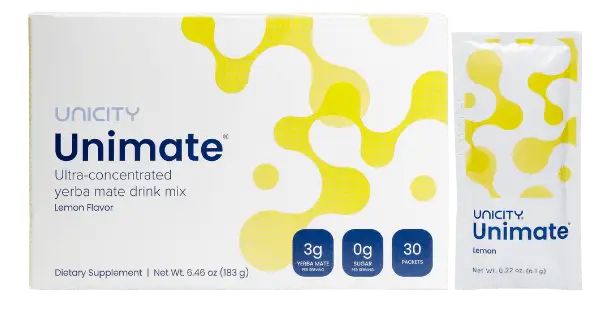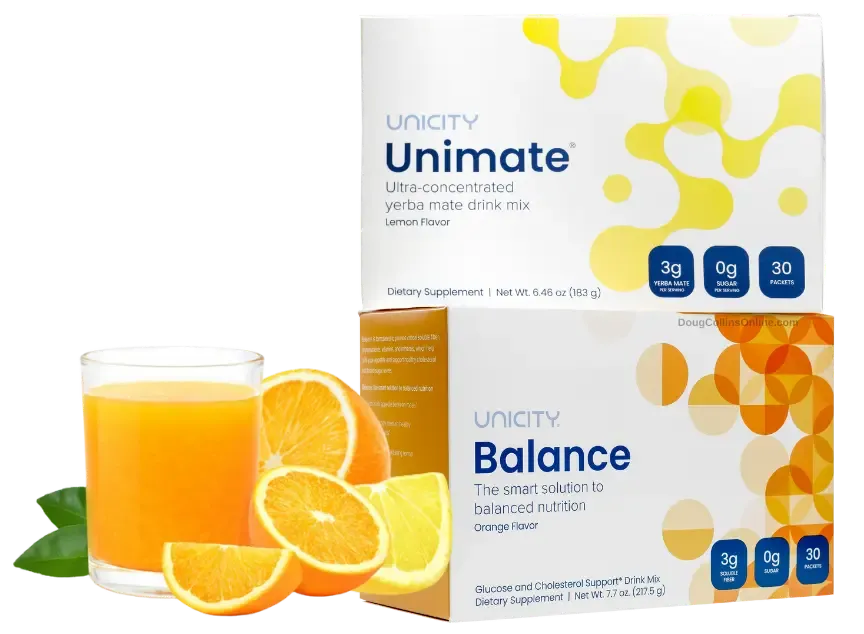Yerba Mate and Cancer: Safe to Consume | Is Unicity Unimate Good for You?
Mar 24, 2023
Yerba mate, a traditional South American drink, has been gaining popularity in recent years due to its associated health benefits. However, there have been concerns raised about the link between yerba mate consumption and cancer.
Article at a Glance:
- Yerba mate has gained popularity due to its health benefits, but concerns have been raised about its link to cancer.
- While some studies suggest a link between yerba mate and cancer, others have shown it may have anti-cancer properties.
- The available evidence is conclusive, and there's an abundance of research showing the health benefits of yerba mate.
- To ensure you're consuming a quality product, it's best to buy from a reputable company that can provide information on processing, packaging and their research.
- Unimate yerba mate is a unique drink grown in South America that undergoes a patented 5-step process, making it 375 times more effective than other commercially available yerba mate drinks.
Yerba mate, a traditional South American drink, has been gaining popularity in recent years due to its associated health benefits. However, there have been concerns raised about the link between yerba mate consumption and cancer.
I have written a number of articles on this topic and will link them here below. In this article, we will take a closer look at the supposed connection between yerba mate and cancer and examine the available evidence to help you make an informed decision.
- Does Unimate Cause Cancer? | Is Yerba Mate Safe to Drink?
- Can Yerba Mate Cause Cancer? A Look at How Unimate Is Processed
- Enjoy Safe Yerba Mate Benefits without Harmful Cancer-Causing PAHs
Some studies have suggested that yerba mate consumption may increase the risk of cancer of the esophagus or other parts of the upper digestive tract. These concerns have led to many people questioning whether yerba mate is safe to consume.
To understand these concerns, let's examine the available evidence. One primary article often referenced is from a study by Eduardo de Stefani linking yerba mate to lung and esophageal cancer. However, the presenter highlights flaws in these studies, such as the use of already sick patients, poor diet, and confounding factors such as alcohol and tobacco use.
As I had discussed in my previous blog articles, the higher temperature at which yerba mate is consumed as it could cause damage to the mucosal lining of the throat and lung, potentially increasing the risk of cancer.
Yerba Mate Health Benefits
It is also worth noting that there has never been a population-based or any scientific study that has conclusively proven yerba mate to cause cancer. In fact, several studies have shown that yerba mate may have anti-cancer properties.
For example, in 2011, a study conducted by Alvaro de Mejia showed that yerba mate destroyed colon cancer cells in vitro. This study was published in Science Daily on on January 23, 2012 titled Compounds in mate tea induce death in colon cancer cells, in vitro study shows. Additionally, several studies have been conducted on the anti-cancer properties of yerba mate and comparisons have been made with other teas such as green tea, believed to have a high anti-cancer potential. Here is a list of some relevant published studies:
-
Gao, H., et al. (2016). "Protective effects of green tea, black tea, and yerba mate extracts on lipopolysaccharide-stimulated RAW 264.7 cells." Journal of Food Biochemistry, 40(6), 635-644. This study investigates the anti-inflammatory and anti-cancer effects of green tea, black tea, and yerba mate extracts on stimulated macrophage cells.
-
Bravo, L., et al. (2007). "Comparative study of the antioxidant and antiproliferative activities of leaf extracts from three Ilex species: Ilex paraguariensis, Ilex dumosa and Ilex pseudobuxus." Food Chemistry, 103(2), 439-444. This study compares the antioxidant and antiproliferative activities of three Ilex species, including yerba mate (Ilex paraguariensis), in relation to their phenolic content.
-
Filip, R., et al. (2007). "Antioxidant activity of Ilex paraguariensis and related species." Nutrition Research, 27(10), 576-582. This study compares the antioxidant properties of yerba mate and other related species, suggesting their potential role in cancer prevention.
-
Kang, Y. R., et al. (2012). "Anti-obesity and anti-diabetic effects of yerba mate (Ilex paraguariensis) in C57BL/6J mice fed a high-fat diet." Laboratory Animal Research, 28(1), 23-29. This study investigates the potential anti-obesity and anti-diabetic effects of yerba mate, which could contribute to reducing cancer risk.
-
Puangpraphant, S., et al. (2011). "Dihydrocaffeoylquinic acids in yerba mate (Ilex paraguariensis St. Hilaire) inhibit NF-κB nucleus translocation in macrophages and induce apoptosis by activating caspases-8 and -3 in human colon cancer cells." Molecular Nutrition & Food Research, 55(10), 1509-1522. This study explores the potential anti-cancer effects of specific compounds found in yerba mate on human colon cancer cells.
As you can see, there are many published research papers on the anti-cancer benefits of yerba-mate. The evidence around the supposed link between yerba mate consumption and cancer is mixed. While some studies suggest a link, and overwhelming number of studies have shown that yerba mate may have anti-cancer properties.
Additionally, there are many more published studies on the health benefits of yerba mate, particularly in the context of glucose metabolism, diabetes, and obesity. Several studies have explored the glucose and diabetes-related beneficial properties of yerba mate and its comparisons with other teas like green tea. Here are some of the studies:
-
de Morais, E. C., Stefanuto, A., Klein, G. A., Boaventura, B. C. B., De Andrade, F., Wazlawik, E., ... & da Silva, E. L. (2009). Consumption of yerba mate (Ilex paraguariensis) improves serum lipid parameters in healthy dyslipidemic subjects and provides an additional LDL-cholesterol reduction in individuals on statin therapy. Journal of agricultural and food chemistry, 57(18), 8316-8324.
-
Gao, H., Huang, Y. N., Gao, B., Li, P., & Inagaki, Y. (2013). Effects of water extract of Yerba Mate (Ilex paraguariensis) on glucose tolerance and obesity in high-fat-fed mice. Journal of Functional Foods, 5(1), 508-515.
-
Kang, Y. R., Lee, H. Y., Kim, J. H., Moon, D. I., Seo, M. Y., Park, S. H., ... & Park, S. J. (2012). Anti-obesity and anti-diabetic effects of yerba mate (Ilex paraguariensis) in C57BL/6J mice fed a high-fat diet. Laboratory animal research, 28(1), 23-29.
-
Kim, S. Y., Oh, M. R., Kim, M. G., Chae, H. J., & Chae, S. W. (2011). Anti-obesity effects of yerba mate (Ilex paraguariensis): a randomized, double-blind, placebo-controlled clinical trial. BMC complementary and alternative medicine, 15(1), 338.
Comparative studies of yerba mate and green tea:
-
Arcari, D. P., Bartchewsky, W., dos Santos, T. W., Oliveira, K. A., Funck, A., Pedrazzoli, J., ... & Ribeiro, M. L. (2009). Anti-inflammatory effects of yerba maté extract (Ilex paraguariensis) ameliorate insulin resistance in mice with high fat diet-induced obesity. Molecular and cellular endocrinology, 303(1-2), 104-110.
-
Bastos, D. H., Saldanha, L. A., Catharino, R. R., Sawaya, A. C., Cunha, I. B., Carvalho, P. O., & Eberlin, M. N. (2007). Phenolic antioxidants identified by ESI-MS from yerba maté (Ilex paraguariensis) and green tea (Camelia sinensis) extracts. Molecules, 12(3), 423-432.
-
Heck, C. I., & De Mejia, E. G. (2007). Yerba mate tea (Ilex paraguariensis): a comprehensive review on chemistry, health implications, and technological considerations. Journal of Food Science, 72(9), R138-R151.
Cancer Causing PALs
What is more realistic, is the post-harvest processing and technologies, as well as the quality control necessary to ensure its safety. studies have found that some traditional yerba mate products can contain harmful chemicals like polycyclic aromatic hydrocarbons (PAH’s) that are known to cause cancer.
Polycyclic aromatic hydrocarbons (PAHs), compounds that are known to be carcinogenic. One study found very high concentrations of these in yerba mate leaves and in both hot and cold infusions of them. (Tobacco smoke and grilled meat also contain PAHs.)
This study was conducted by the International Agency for Research on Cancer (IARC), which found high concentrations of polycyclic aromatic hydrocarbons (PAHs) in yerba mate leaves and infusions. The study was published in the journal Food and Chemical Toxicology in 2003.
Although some believe that the smoke-drying process used in yerba mate production can cause the release of the carcinogenic chemical PAH (polycyclic aromatic hydrocarbons), there is no conclusive evidence to support this hypothesis.
While some research has suggested a possible link between PAH and yerba mate, there is no evidence to suggest that yerba mate consumption is linked to cancer. Therefore, avoiding yerba mate solely for this reason should not be a major concern.
So, what does all this mean for you?
Yerba mate, like wine and coffee, comes in many different varieties. It is cultivated in Argentina, Paraguay, and Uruguay, and each country has its own unique style of yerba mate. To ensure that you're purchasing a quality product, it's best to buy from a reputable company that can provide information on the processing, packaging and the science behind of the yerba mate.
The yerba mate in Unicity Unimate is unlike any other yerba mate on the market. This yerba mate is grown in South America and undergoes a 5-step patented process to make it 375 times more effective than other commercially available Yerba Mate drinks. The 5-step process is: Hand Picked, Fire Roasted, Extracted, Concentrated, Purified.
In conclusion, the link between yerba mate consumption and cancer is not clear-cut. While some studies suggest a link, others have shown that yerba mate may have anti-cancer properties. ensure that the yerba mate you consume is of good quality, and that it has been processed and stored correctly.
Related Articles:
- Unimate vs other Yerba Mate Drinks
- FAQ: Unimate Yerba Mate Drink Frequently Asked Questions
- Unicity Unimate Yerba Mate: Ingredients & Benefits
Order Unicity Unimate at the lowest discounted Wholesale Pricing and Satisfaction Guaranteed!

Unicity Unimate
Yerba Mate Drink
1 Box | 30 Packets
Feel Better Than You Have In Years!



